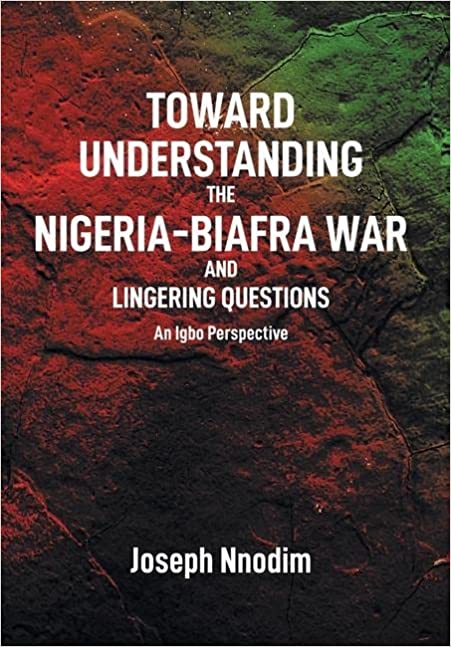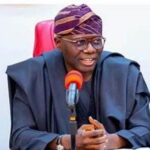

By Okunzuwa Osawaru
As has often been said, history is too important to be left to the historians. And so, a physician-scientist has taken it upon himself to place on record an account of what he considers one of the most seismic events in the modern human history – the Nigeria-Biafra War which raged between 1967 and 1970.
No conflict in Africa, the cradle of the human race and the second largest continent on planet Earth, had claimed so many human lives, before or since. It happened when he was a youngster and he did not have the mental wherewithal at the time to process all the horror that was unfolding before his very eyes. Now older, he has made a journey toward understanding that nightmare and believes that there are thoughts he should share.
The book, Toward Understanding the Nigeria-Biafra War and Lingering Questions, is a thoroughly researched disquisition on the British engagement with the peoples of the lower Niger River basin which resulted in the creation of the Nigerian state and its first post-independence decade. It is divided into several distinct parts, the first of which deals with the fabrication of the Southern and Northern Protectorates and their amalgamation in 1914. The Protectorates comprised very disparate ethnic groups with no commonality of purpose or civic principle. Nevertheless, they were launched together on a trajectory to independence. Attitudes to the British were very different in the protectorates. In the North, they were very welcome and they reciprocated with undue magnanimity, as in the apportionment of legislative seats such that the North always had the political upper-hand. This had the effect of creating an unsettling sense of entitlement to rulership in the minds of many Northern politicians and wove instability into the fabric of the body politic. In the South, for the most part, the elite merely tolerated the British and couldn’t wait for them to leave at independence in 1960.
Colonial policies mischievously nurtured the differences among the ethnic constituents to the extent that at independence in 1960, the indigenous political class were bequeathed a toxic legacy of inter-ethnic suspicion and unresolved problems. As a result, the country lacked the capacity to conduct a valid census, let alone hold credible elections. The second part of the book deals with the travails of the neonatal nation. The unraveling came in January 1966 when mayhem in the West caused young army officers to attempt a coup d’état. They succeeded only in the North and fatefully, the majority of them were Southerners of Igbo extraction while the majority of senior politicians and military officers killed in the coup were Northerners. It is telling though that their plan had been to install a non-Igbo civilian as head of government. The top brass in Lagos stepped in and accepted the transfer of power from what remained of the federal government. The young officers gave themselves up and were incarcerated. After an uneasy interlude of 6 months, Northern officers perpetrated an even bloodier revenge coup, killing the Head of State and the Governor of the West.
Thereafter, all hell broke loose and the third part of the book chronicles the waves of pogrom inflicted on the Igbo and other Easterners who lived in the North by Northern soldiers and hordes of Fulani-Hausa. About 50,000 were gruesomely killed and 1.6 million fled back to the East. The most senior army officer of Northern origin who has assumed power in Lagos was incidentally junior to at least half a dozen officers from the South. Further, he appeared unable or unwilling to bring a halt to the bloodletting. The Governor of the East therefore assured him that although he would work with him to defuse the crisis, he could not recognize his usurpation.
In January 1967, the regional Military Governors and the Head of the Government in Lagos met at Aburi, Ghana and important agreements were reached on measures to ease tension and work toward normalization. The fourth part of the book describes how, upon their return to Nigeria, the government in Lagos reneged on the agreements reached. The East took innocuous steps to ensure that it could continue to support the refugees who had surged into the region on a biblical scale. They did not involve petroleum revenue. Nevertheless, the federal government retaliated with an embargo and then proceeded, with no legitimate mandate of any kind, to restructure the country, dividing the East into three states. The East seceded, proclaiming itself the Sovereign Republic of Biafra on May 30, 1967. Two months later, Federal Nigeria declared war on an ill-prepared Biafra. After 3 months of bitter fighting and a failed coup d’etat to overthrow the government of Biafra, the capital city, Enugu, fell to federal forces but a war of attrition raged on for 27 more months. The economic, diplomatic and military consequences of Biafra’s unpreparedness are exhaustively documented. The author posits that formal secession was a faux pas which played right into the hands of her detractors.
The fifth part of the book is devoted to what the author describes as “the most heinous atrocity of the conflict”, namely the death of over one million children as a result of a deliberate, overtly avowed policy of mass starvation as a weapon of war. The details are spine-chilling and best left to the reader to judge. It leaves one struggling with the question of how deserving of worship an idol could ever be if at its altar, the priesthood remorselessly sacrificed over one million innocents.
In the final part, the author undertakes an assessment of the separate roles played by the Biafran leadership and citizenry and how they contributed to the disastrous final outcome. He does not hold back. He points out that political acumen was not the Biafran Head of State’s strong suit and the Constituent Assembly failed to provide adequate oversight or counterpoise.
Although Biafra was made up of multiple ethnic nationalities, the Igbo were the largest. Among the non-Igbo were many of the finest champions of the Biafra project. However, there were those who fancied a separate state of their own within Nigeria. These two non-Igbo groups probably balanced out, for which reason the author devoted the analysis of citizen participation to just the Igbo. He delves in considerable depth into the ethnography of the Igbo in the effort, he claims, “to explicate ‘this thing’ about them that so riled the British in colonial times and, to this day, make their neighbors in the Nigerian political space still very uncomfortable and insecure, irrespective of the formidable impediments that had been placed around them”. He describes their approaches as often dangerously direct and blunt, bereft of guile and dissemblance. They also appear to have difficulty in appreciating that their intentions and actions, no matter how well-motivated, could be misinterpreted, even deliberately distorted and manipulated to their disadvantage by other players in the political arena.
The book concludes with reflections on the aftermath of the war. In spite of the sloganeering at the time to the contrary, policy measures were undertaken to punish the Igbo. No further reference was made to the waves of pogrom they had been subjected to in the lead-up to the war. Neither was there acknowledgment that over a million children had died as a result of weaponized starvation by the federal government. The head of the wartime government was eventually overthrown on July 30, 1975 but not for that atrocity which so infamously stigmatized his stewardship.
The OAU had hidden behind its charter of inviolability of the colonial boundaries inherited at independence. It turns out that these boundaries were mutable and there was nothing sacrosanct about them.
Doctors and other humanitarian workers looked on in horrified puzzlement as the quibbling over territorial integrity hobbled relief efforts and caused the death and suffering of children on an industrial scale. The Nigeria-Biafra war was the founding inspiration for Medecins sans Frontieres. It also stimulated the development of the doctrine of Droit et Devoir d’Ingerence in international law.
A good number of books have been published on the Nigeria-Biafra War – by foreign war correspondents who covered it, soldiers who fought in it, memoirists who lived through that time and a few historians. The foreign journalists wrote during or too soon after the conflict when many of the pieces were still up in the air. Soldiers’ war diaries and memoirs offer very narrow and necessarily subjective viewpoints. Some of them ignore, minimize or falsify key events to suit their purposes.
Toward Understanding sets itself apart by virtue of the depth of the research that underpins it and the unique perspective it purveys (that of the losing side of the conflict). It grapples with the Igbo experience in the history of Nigeria in singular fashion, showing how the maladaptations of their ethnic psyche to the culture of the political household they were compelled to inhabit, caused them recurrent grief. The Nigeria-Biafra War did not happen just because the East seceded. The Igbo were killed in the tens of thousands before the war and nearly two million perished (including over a million children) in the course of it. After the war, the survivors were held responsible for it and severely punished. Their perspective on the conflict and its aftermath is bound to be different and has rarely found expression.
As never before, attention is drawn to the harrowing death of over a million children as a result of a deliberate policy to utilize starvation as a “legitimate” weapon of war. This gory statistic has tended to be side-stepped in most other accounts of the conflict but Toward Understanding makes the point that it must be kept vivid in the national memory.
The work is also timely because so much of what is happening in present-day Nigeria have their roots or explanations in aspects of the history of the country that have been denied deserved attention and Toward Understanding has made an effort to present that history in a comprehensive yet compact and readily accessible fashion. Not too long ago for instance, the Igbo were described, with maudlin casuistry, as a “dot in a circle”, an undisguised reference to the policy of the federal government to hem in the Igbo on all sides and incapacitate them by so doing. It was formulated during the civil war and has apparently remained the mindset of the federal government ever since. The endurance of such punitive sentiments at the very highest levels justifies a work like Toward Understanding – to challenge the status quo, add value to the national conversation and nudge the collective consciousness, hopefully, towards the “truth and reconciliation” that are yet to happen.
I enjoyed reading Toward Understanding as much as I was troubled by the issues it laid bare. Its style is candid and forthright. The presentation is multilayered and the analysis, insightful. It is highly educational, helping the reader appreciate how the country’s unresolved problems are rooted in its colonial legacy, learn the true cost of the conflict and the perspective from the side less heard from as well as understand the limitations of violence-dependent solutions to problems in a diverse, multiethnic, contrived society like Nigeria. It however suffers from one drawback – bias. Toward Understanding is just one viewpoint – that of an Igbo – which the author incidentally fully acknowledges in the subtitle. He makes clear though that he went to great lengths to ensure that the facts themselves were correctly stated. It is conflict-of-interest superbly managed. Toward Understanding is a worthy contribution to the
Nigerian history canon and the hope actually is for a profusion of works conveying particular perspectives.
Having reviewed Toward Understanding, I believe I am expected to rate it. I pause. Then I take away a half-star from the five. It is compelling reading and very strongly recommended.
The post Nnodim’s perspective of Nigeria-Biafra war & lingering questions appeared first on Vanguard News.





